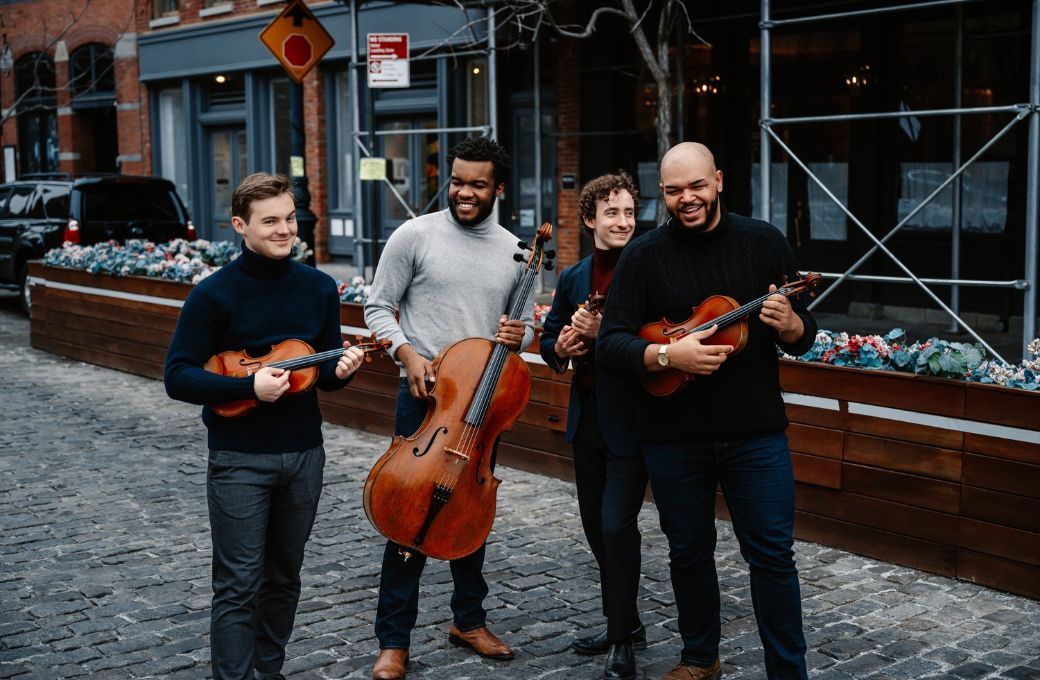When music lovers think of string quartet ensembles, a few names immediately come to mind: Emerson, Takács, Guarneri, Kronos. Any newly formed group could naturally be intimidated by such illustrious forebears, but the Isidore String Quartet is undaunted – and notable for both their accelerated rise and the innate quality of their musicianship. Composed of violinists Adrian Steele and Phoenix Avalon, violist Devin Moore, and cellist Joshua McClendon, the group formed while undergraduates at the Juilliard School, and have already made their mark on the chamber music world in just a few short years.

Their big break came in the form of a victory at the Banff International String Quartet Competition, which lifted their position from a talented group of up-and-coming instrumentalists to one of the most visible young string quartets in the world. They are currently preparing a North American recital tour, which includes an appearance in New York at The 92nd Street Y on April 25th, after playing a series of concerts in Germany and Europe last fall.
Although the group is relatively young – both in terms of playing history and the ages of its members – it represents the culmination of several lifelong ambitions. “I have pretty much been hoping to play in a string quartet in some sort of professional capacity since I started playing cello,” says McClendon, a native of Detroit, Michigan. “I started when I was eight on cello, after playing the violin for five years prior to that. I played my first string quartet probably around a year-and-a-half into playing the cello, and pretty much from the start, I knew that was a medium I enjoyed more than anything else. It’s a pretty crazy career path to try and get into, so I think it’s something that had always been in the back of my mind. It didn’t always feel like there was a clear way to get into it, but I sort of kept making sure I was playing a lot of string music all the time.”
Devin Moore, who grew up in Pittsburgh, Pennsylvania, echoes his colleague’s sentiments. “I always loved chamber music,” he says. “It’s sort of how I became a musician in general. Growing up in Pittsburgh, on the weekends with my friends, we would go over to each other's houses and play chamber music, or go out and busk in downtown Pittsburgh. I knew I loved it, but from a more practical standpoint, there is no rulebook for chamber music. There is no rulebook for a string quartet.”
Unlike aspiring solo instrumentalists and orchestral musicians, fewer paths exist for string quartets looking to focus primarily on chamber music. “If you win Queen Elisabeth, you start a solo career,” Moore says. “If you win a New York Philharmonic audition, you join the orchestra. Banff was one of the only things I knew of that could really jumpstart a career.”
The group always had an ambition to compete at Banff, but when they applied in 2022, they had only been playing together for about two years. Still, even before they won, there were signs that coming to Canada was the right decision, according to McClendon.
“Banff was run in quite a unique way as a competition,” he says. “First, we had a wonderful group of colleagues there who were also competing. Just having such a warm group of string quartets there really helped a lot. The Banff Centre runs the competition more as a celebration of great string quartet playing. It’s very rare that you have a chance to have 10 quartets in the same place that are all playing at such an incredible level, and who have such a deep love for chamber music. They really make that the priority of why we’re there, and it removes some of the pressure of competing.”
“The thing that sticks out to me the most is the celebration of the string quartet,” Moore says. “It’s a great way to describe that competition. I had never done any competitions besides maybe some collegiate concerto competitions, but nothing at this scale, and I had no idea what to expect. Even though I had heard stories from all my colleagues and friends about how rigorous it is, the nature of competitions doesn’t sit well with my soul. I had a little trepidation going in. Barry [Shiffman, the competition’s director] and the entire team at Banff curate an experience that really feels like a festival, and I think that allowed all participating quartets to put our best feet forward. I had an extraordinary experience, despite it being ungodly nerve wracking! Some of my favorite moments were just eating and talking with the other quartets, hearing some great music, and being in the beautiful mountains.”
The rigorous competition schedule includes five rounds over the course of 10 days, representing the breadth and depth of the string quartet repertory. Competitors must play works by Haydn and Beethoven, a selection from the Romantic period, a piece written in the 21st century, and a work commissioned for the contest by a living Canadian composer. There is also an ad-libbed recital. All performances take place before a live, paying audience of aficionados who travel to Canada from around the world to attend.
The Isidore settled on Billy Childs’ String Quartet no. 2, “Awakening” for their contemporary piece, and the work has since become a cornerstone of their recital repertoire. Commissioned in 2012 by the Ying Quartet, the work takes its inspiration from the composer’s experience of learning that his wife had suffered a pulmonary embolism. Yet despite this serious context for the work’s composition, the music’s emotional character is diverse. Incorporating anxiety as well as healing and resolution, the musical language utilizes Childs’ experiences as both a classically trained cellist and an award-winning jazz pianist and composer.
Moore first learned of the work through a professional connection to Childs. “During the pandemic, I started a nonprofit with one of my colleagues called Opus Illuminate, which was focused on uplifting underrepresented voices and taking advantage of the opportunity to grow our repertoire list during the pandemic,” he says. “Eventually, that morphed into a season where we were able to do a documentary, and Billy was one of the composers we chose to interview.
“Through that process, I not only became aware of Billy’s classical music, but I also got to know him as a person. We did the interview in the backyard of his home in LA, and it was great to build that personal relationship with him. When we applied for the Banff competition and needed a 21st century work to pair with the Haydn quartet, his Second Quartet immediately came to mind. Now it’s a staple of our repertoire, and audiences all over the US, Canada and Europe have really fallen in love with this piece. It’s great, because you never know how people are going to react to music they’re not familiar with.”
The subtitle of Childs’ work, “Awakening,” has become the title of the Isidore’s current recital program. Their concerts usually open with a quartet by Haydn or Bach, with the Childs quartet in the central spot. The concluding work is usually a quartet by Beethoven. For their 92NY concert – which comes on the heels of receiving an Avery Fisher Career Grant – the program will feature Bach’s Contrapunctus 1 and Beethoven’s String Quartet in A minor, Op.132.
“The idea of Awakening is the throughline,” Moore says. “Haydn exhibits the awakening of the string quartet with his Opus 20 quartets, the experimental time of figuring out what you can do with these four instruments. But it’s music that people are a little more familiar with when coming to a string quartet concert. Starting with Haydn and going into Billy Childs creates a baseline understanding of our own programmatic ideals.
“We always talk about the Childs quartet before we play it, to provide some context,” Moore explains. “It’s a very emotional, very relatable piece. Billy’s sound world pulls from so many different places, both familiar and unfamiliar – whether it’s jazz or classical or neither of those – that no matter what background you come from, there is some tether that brings you in. The story, the programmatic aspect of the piece, is what a lot of people connect to. In the second half, we usually have the Beethoven Opus 132. That combines the ideas of Haydn and the health issues represented in the Billy Childs. You have this sort of Venn diagram of all these pieces.
“People can take something that is familiar to them and will help them understand this piece,” Moore continues. “It’s also just a really exciting, great piece. There’s a lot to pay attention to in those 20 minutes. He uses the quartet in such a fascinating way that, even if you have no idea what the story is about, you’re still interested in what’s going on onstage.”
The Isidore String Quartet perform at 92nd Street Y on April 25th.
This article was sponsored by 92NY.


